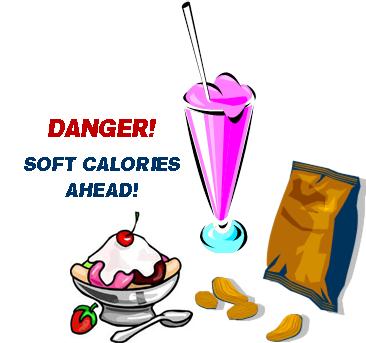Tighter Isn't Always Better

MORE, MORE, MORE
Americans love MORE: more of anything and everything. More food, more fun, and (for some of us) more fill in our bands. But striving for maximum fill in the effort to achieve maximum weight loss can be a terrible mistake.
Fat folks become obese enough to qualify for bariatric surgery because we’ve been eating more, more, more, so it’s not surprising that bandsters long for more, more, more fill. The tighter the band, the better, right?
Wrong. Here’s why: tighter doesn’t automatically yield more weight loss. It can cause eating problems, side effects and complications that none of us want. It can compromise our quality of life. It can make us miserable when all we hope for from bariatric surgery is a better life.
You’re not impressed by all that? You’re willing to risk everything in the pursuit of skinny? Then try this on for size. A tight band doesn’t guarantee weight loss. Just the opposite: it can stall your weight loss or even make you gain weight.
Do I have your full attention now? Good. Listen up and I’ll explain why tighter isn’t always better.
THE RESTRICTION FALLACY
Traditionally, the adjustable gastric band has been considered a “restrictive” weight loss surgery. Bandsters were taught to look for signs of restriction: the proofs that their bands were working. Instead of paying attention to her own eating behavior and lifestyle, the bandster waited impatiently for the flashing signs, ringing bells and slamming doors that would stop her from overeating. The idea was that the small upper stomach pouch would “restrict” food intake and result in weight loss. Sound familiar?
That was well-intentioned thinking, but it was wrong. In the past 5 or so years, band manufacturers and bariatric surgeons have come to believe that it’s a mistake to eat and eat until you set off your band’s emergency warning system, for the reasons mentioned above. Unfortunately, the re-education process is slow going, and in the meantime, the restriction fallacy lives on. Even now, approximately every third word out of a bandster’s mouth is “restriction”. It’s a catch-all term for the feelings that limit how much a bandster eats. Post-op band life tends to become a quest for enough fills to reach the Holy Land of Restriction. Next stop: Skinnyland.
Or not.
HAZARD AHEAD! THE DANGERS OF SOFT CALORIE SYNDROME
Soft Calorie Syndrome is one of the least publicized dangers of a band that’s too tight. Psychologists would call it a maladaptive behavior, that is: a nonproductive behavior that prevents you from adapting to situations, or changes in yourself or your environment, in a healthy way. It can begin as an attempt to deal with or avoid an unpleasant experience but it does not solve the original problem and eventually becomes dysfunctional. You can read more about maladaptive eating behaviors by clicking here: http://www.bariatricpal.com/page/articles.html/_/healthy-living/is-your-eating-maladaptive-r50
A bandster experiencing Soft Calorie Syndrome is responding to the unpleasant experience of eating with a band that’s too tight by eating the soft and liquid calories that slide most easily past their gatekeeper band. Instead of eating the healthy and solid foods (like dense animal protein, veggies, fruits) that provide the most satiety (both early and prolonged), that person favors easy-to-eat food that’s often junky and high in calories (for example: potato chips, ice cream, milkshakes). Even healthy foods( like yogurt, cottage cheese and, fat-free/sugar-free pudding) can fall into the soft calorie category, and they don’t provide any better satiety than the junky stuff. The net result is that you end up consuming more calories than you need because the soft stuff doesn’t provide enough early and prolonged satiety. And the result of that is a weight loss plateau, or even weight gain.
I discovered the perils of Soft Calorie Syndrome for myself when I traveled to New York City to attend a trade show when I was about 8 months post-op. I had gotten a fill the day before I left, and by the time I got to New York I had realized that my band was too tight for me to tolerate. I couldn’t eat any solid food, so I spent the next 3 days eating soft, high-calorie, low-satiety foods like creamy soups, milkshakes, and ice cream. I was just trying to survive long enough to go home and get an unfill. My maladaptive eating behavior achieved a temporary goal (comfortable survival) while sabotaging my long term goal of losing weight. In fact, I gained weight during that trip and ended up feeling disappointed in myself. I promised myself no more fills on Fridays and no more fills the day before a business trip. I called my surgeon’s every time I suspected my band was too tight and found that even tiny unfills could make all the difference in my quality of life as well as my weight loss.
I know I’m not the only person who’s discovered the perils of Soft Calorie Syndrome. I also know that you’re not alone in believing that more fill is better and that unfills will slow or stall your weight loss. A few months ago I talked about this with a smart and successful bandster named Denise. When her surgeon reacted to her too-tight band by suggesting an unfill of .5 cc, her dazed and frightened face made him reassure her that she could start being re-filled in a month. The month ahead scared her, but she agreed to the unfill, and discovered that rather than returning her to Bandster Hell, it had restored sanity to her eating life. She said, “I was able to eat again. Solids went down easily. Bread was on my menu. Meals lasted me several hours. I didn’t snack because I was able to eat enough to keep me satisfied.”
When Denise went back to her surgeon a month later, he was delighted her hear her say that she didn’t even need a re-fill. She told him, “I can eat anything, but I’m not eating everything.”
And that, my friends, is what healthy eating is all about.
EXCELLENT article!! I hope everyone, newbies and veterans alike, read this and take note.
MORE, MORE, MORE
Americans love MORE: more of anything and everything. More food, more fun, and (for some of us) more fill in our bands. But striving for maximum fill in the effort to achieve maximum weight loss can be a terrible mistake.
Fat folks become obese enough to qualify for bariatric surgery because we’ve been eating more, more, more, so it’s not surprising that bandsters long for more, more, more fill. The tighter the band, the better, right?
Wrong. Here’s why: tighter doesn’t automatically yield more weight loss. It can cause eating problems, side effects and complications that none of us want. It can compromise our quality of life. It can make us miserable when all we hope for from bariatric surgery is a better life.
You’re not impressed by all that? You’re willing to risk everything in the pursuit of skinny? Then try this on for size. A tight band doesn’t guarantee weight loss. Just the opposite: it can stall your weight loss or even make you gain weight.
Do I have your full attention now? Good. Listen up and I’ll explain why tighter isn’t always better.
THE RESTRICTION FALLACY
Traditionally, the adjustable gastric band has been considered a “restrictive” weight loss surgery. Bandsters were taught to look for signs of restriction: the proofs that their bands were working. Instead of paying attention to her own eating behavior and lifestyle, the bandster waited impatiently for the flashing signs, ringing bells and slamming doors that would stop her from overeating. The idea was that the small upper stomach pouch would “restrict” food intake and result in weight loss. Sound familiar?
That was well-intentioned thinking, but it was wrong. In the past 5 or so years, band manufacturers and bariatric surgeons have come to believe that it’s a mistake to eat and eat until you set off your band’s emergency warning system, for the reasons mentioned above. Unfortunately, the re-education process is slow going, and in the meantime, the restriction fallacy lives on. Even now, approximately every third word out of a bandster’s mouth is “restriction”. It’s a catch-all term for the feelings that limit how much a bandster eats. Post-op band life tends to become a Quest for enough fills to reach the Holy Land of Restriction. Next stop: Skinnyland.
Or not.
HAZARD AHEAD! THE DANGERS OF SOFT CALORIE SYNDROME
Soft Calorie Syndrome is one of the least publicized dangers of a band that’s too tight. Psychologists would call it a maladaptive behavior, that is: a nonproductive behavior that prevents you from adapting to situations, or changes in yourself or your environment, in a healthy way. It can begin as an attempt to deal with or avoid an unpleasant experience but it does not solve the original problem and eventually becomes dysfunctional. You can read more about maladaptive eating behaviors by clicking here: http://www.lapbandtalk.com/page/index.html/_/healthy-living/is-your-eating-maladaptive-r71
A bandster experiencing Soft Calorie Syndrome is responding to the unpleasant experience of eating with a band that’s too tight by eating the soft and liquid calories that slide most easily past their gatekeeper band. Instead of eating the healthy and solid foods (like dense animal Protein, veggies, fruits) that provide the most satiety (both early and prolonged), that person favors easy-to-eat food that’s often junky and high in calories (for example: potato chips, ice cream, milkshakes). Even healthy foods( like yogurt, cottage cheese and, fat-free/sugar-free pudding) can fall into the soft calorie category, and they don’t provide any better satiety than the junky stuff. The net result is that you end up consuming more calories than you need because the soft stuff doesn’t provide enough early and prolonged satiety. And the result of that is a weight loss plateau, or even weight gain.
I discovered the perils of Soft Calorie Syndrome for myself when I traveled to New York City to attend a trade show when I was about 8 months post-op. I had gotten a fill the day before I left, and by the time I got to New York I had realized that my band was too tight for me to tolerate. I couldn’t eat any solid food, so I spent the next 3 days eating soft, high-calorie, low-satiety foods like creamy Soups, milkshakes, and ice cream. I was just trying to survive long enough to go home and get an unfill. My maladaptive eating behavior achieved a temporary goal (comfortable survival) while sabotaging my long term goal of losing weight. In fact, I gained weight during that trip and ended up feeling disappointed in myself. I promised myself no more fills on Fridays and no more fills the day before a business trip. I called my surgeon’s every time I suspected my band was too tight and found that even tiny unfills could make all the difference in my quality of life as well as my weight loss.
I know I’m not the only person who’s discovered the perils of Soft Calorie Syndrome. I also know that you’re not alone in believing that more fill is better and that unfills will slow or stall your weight loss. A few months ago I talked about this with a smart and successful bandster named Denise. When her surgeon reacted to her too-tight band by suggesting an unfill of .5 cc, her dazed and frightened face made him reassure her that she could start being re-filled in a month. The month ahead scared her, but she agreed to the unfill, and discovered that rather than returning her to Bandster Hell, it had restored sanity to her eating life. She said, “I was able to eat again. Solids went down easily. bread was on my menu. Meals lasted me several hours. I didn’t snack because I was able to eat enough to keep me satisfied.”
When Denise went back to her surgeon a month later, he was delighted her hear her say that she didn’t even need a re-fill. She told him, “I can eat anything, but I’m not eating everything.”
And that, my friends, is what healthy eating is all about.
reading about people who (keep it super tight) is kinda scary.
i mean do we keep it so tight so we lose weight fast while we cant drink or eat and so on or do we go lose so we can eat properly and help the band?
i choose the latter. and if i am slower to lose, so be it..at least i am not hurting myself. and frankly i have hurt myself enough over the years.
reading about people who (keep it super tight) is kinda scary.
i mean do we keep it so tight so we lose weight fast while we cant drink or eat and so on or do we go lose so we can eat properly and help the band?
i choose the latter. and if i am slower to lose, so be it..at least i am not hurting myself. and frankly i have hurt myself enough over the years.
And if we could lose weight, and keep it off, by consuming only liquids (like Protein shakes) for the rest of our lives, why have bariatric surgery in the first place?
Thank you ...very good reading
Thanks for this article Jean. It's an eye opener.
Thankyou Thankyou Thankyou!!!! I hope everyone reads this post!!!!!!!!
Everytime I read your articles I think "oh that's good". But this article was one of your best (until the next one,lol).
I truly hope everyone reads this.
Thanks again Jean!
You know, there's a couple of generations of bandsters who were told they could eat anything on the band as long as the band would allow it. They're not going to like what you just said?
I see it often where people claim that the reason they got the band was that it would keep them from eating too much or eating the wrong things. We all try to re-educate of course. But, did they hear that from a professional or was it some off the cuff remark made by someone on a forum somewhere? Probably both?
Anyway, I couldn't agree more. I find myself opting for soft calories when we go out so that I don't get stuck. Not a lot of fun sitting at a table with 8 people while everyone is gobbling and I can't even sip my Water.
tmf
You know, there's a couple of generations of bandsters who were told they could eat anything on the band as long as the band would allow it. They're not going to like what you just said?
I see it often where people claim that the reason they got the band was that it would keep them from eating too much or eating the wrong things. We all try to re-educate of course. But, did they hear that from a professional or was it some off the cuff remark made by someone on a forum somewhere? Probably both?
Anyway, I couldn't agree more. I find myself opting for soft calories when we go out so that I don't get stuck. Not a lot of fun sitting at a table with 8 people while everyone is gobbling and I can't even sip my Water.
tmf
You're so right. That's why I said, "the re-education process is slow going." And even when surgeons and their staff get up to speed with patient education, it's entirely possible that patients who are so eager (as I was) to have WLS that they dismiss everything they hear and don't like will still end up wondering what went wrong.
Information and anecdotal reports found on online forums like LBT have a lot of flaws that can be hard to sift through, but one of the best things Alex Brecher has brought to the WLS community is the open exchange of personal experience and the nitty gritty of what works for real life patients, and what doesn't.
Great article Jean!
Thanks Jean, sound advice as usual!
Maybe I glazed over this in your article(and I realize it's about soft calories due to overly tight bands) but using the "restriction" word again, how else can a newly banded patient grasp the satiety concept? It seems to be such a slow process for many of us. I know for me it's taken a year to finally recognize those signals. In the meantime I've seen other bandsters flounder and even fail due to not being able to find the zone.
Restriction seems to be the first signal the band is in our body? This forum is a good tool for many patients who aren't getting the feedback from their support systems(docs) and yes, one must wade through the misinformation to find the truth. Now I've come to the point where I go back to one of your early articles "Restriction, the holy grail" and it seems like the heading is very prophetic. Sorry to ramble, but the green zone, sweet spot or whatever one calls it is illusory and can be non existent for some.
Seems like more one on one, mano e mano would surely increase the success ratio?
Dan
tmf
Great article! Very informative For someone that's Pre-Op like myself!
You know, there's a couple of generations of bandsters who were told they could eat anything on the band as long as the band would allow it. They're not going to like what you just said?
I see it often where people claim that the reason they got the band was that it would keep them from eating too much or eating the wrong things. We all try to re-educate of course. But, did they hear that from a professional or was it some off the cuff remark made by someone on a forum somewhere? Probably both?
Anyway, I couldn't agree more. I find myself opting for soft calories when we go out so that I don't get stuck. Not a lot of fun sitting at a table with 8 people while everyone is gobbling and I can't even sip my Water.
tmf
No, the old-school bandsters probably wouldn't like this article, but presumably they're focused on something quite different from WLS by now.
I think a lot of misunderstandings arise when advice from medical professionals and patients and who knows who else gets jumbled up so much that no one can remember the source of a particular myth, belief, opinion or "fact". Today I had to take one of our dogs to the vet for his annual exam. While we were waiting, I overheard half of a phone conversation between one of the front desk ladies and a pet owner who wanted to know how much it would cost to declaw and spay her cat. She was obviously dismayed by the price and insisted that "someone" had told her it would cost less if it was done in a single procedure, with the cat anesthetized only once. The office lady said, "Who told you that? Someone here? Because that's not correct, and that's the price we've charged for those procedures for years now." Of course, the cat lady couldn't remember who told her that, but felt that the vet's office was lying about it. She just didn't want to hear what they were trying to tell her.
The same is true with human medicine. A few months ago when I told a distant family member that I'd lost 90 lbs thanks to my band, this otherwise extremely intelligent and well-informed man said, "Wow! So, how does that work? I mean, you eat as much as you want and you lose weight?" For a minute or two, I thought he was joking.
I devote a lot of pages in Bandwagon to explaining how to recognize satiety, and because I would really like people to buy the book to learn about that, I haven't been giving away that advice for free. Also, as you know, satiety is a very individual thing. I think I'd better reconsider satiety as a future LBT article.














☠carolinagirl☠ 18,722
Posted
thank you so much for this.
explains alot, esp to one who has no fills yet.
Share this comment
Link to comment
Share on other sites